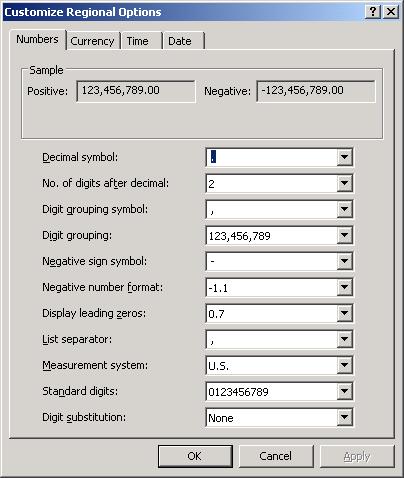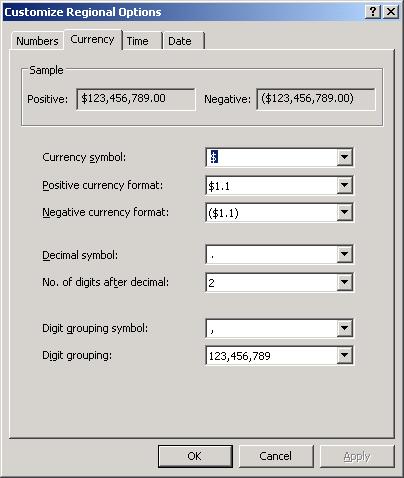Comparison I18N: Difference between revisions
Wolfganguhr (talk | contribs) |
Wolfganguhr (talk | contribs) |
||
| Line 43: | Line 43: | ||
[[File:Numbers.JPG]] [[File:Currency.JPG]] | [[File:Numbers.JPG]] [[File:Currency.JPG]] | ||
See: http://msdn.microsoft.com/en-us/library/system.globalization.numberformatinfo.aspx | See: http://msdn.microsoft.com/en-us/library/system.globalization.numberformatinfo.aspx | ||
In order to run a proper I18n we shall have a short look onto the APIs already implemented in .net. Therefore you shall have a look onto the parameter settings which are available referring (http://msdn.microsoft.com/en-us/library/abeh092z.aspx). There are a lot of parameters already involved and there are some parameters mission. | |||
A complete record of properties for the numbers, the currencies, the times and the dates, is called a CultureInfo-Class. Of course if you only want to get access to a number a NumberFormatInfo will work too, but a proper I18n contains two steps. NumberFormatInfo only knows a constructor without any parameters but CultureInfo enables to select a special “LCID” or a value of a Locale Chart (http://msdn.microsoft.com/en-us/library/0h88fahh%28VS.85%29.aspx). This values are a concrete realization of the RFC 4646 (http://www.ietf.org/rfc/rfc4646.txt) and a best practice concept to handle those problems. | |||
Let us have a look to an example. The string “String strExample = "For this object you have to pay {0} until tomorrow."” contains a variable which shall be replaced by the a value “decimalValue = 1.23456m”. This can be done with a StringBuilder-Class “stringBuilder.AppendFormat(strExample, decimalValue.ToString("C"))”. If you run this code on a PC with US-American settings, you will have the result “For this object you have to pay ($1.23) until tomorrow.”. You should know that negative currency values are written in brackets in the United states. In England the result will be “For this object you have to pay -£1.23 until tomorrow.” | |||
Problems are: | |||
# The language and the settings of the operating system is not necessarily the language of the user. | |||
# The CultureInfoRecord is not complete. For example there exists a smallest value of currency in any currency of the word. This value actually not handled by this record. | |||
# The CultureInfoRecord is something restrictive. All three entries for Switzerland de-ch, fr-ch and it-ch bring out the currency as “Fr. …” and not as CHF. | |||
# The proper choice of the CultureInfo-Settings shall be made either unique for a complete office (German Gruppenrichtlinien) or shall be handled by openpetra itself in order to avoid some conflicts. | |||
# CultureInfo only handles the properties inside a specific language. The negative Dollar-values for example are brought out in USA correctly but in Germany we shall write “For this object you have to pay -1.23 $ until tomorrow.” | |||
Consequences: | |||
# OpenPetra shall handle a subset of the LCID-references (http://msdn.microsoft.com/en-us/library/0h88fahh%28VS.85%29.aspx) and the decimal values seems to be the best choice. | |||
# OpenPetra shall provide some more parameters to handle all I18n-Problems. | |||
Revision as of 09:46, 9 December 2010
Criteria
- easy for translators (do they need the full IDE? poedit?)
- easy to update translations
- easy for users to switch between UI languages; restart should be ok
- GUI size changes (some languages need more space)
- support asian languages
- not only language, but also culture settings
Winforms resources
- Example: SharpDevelop uses resource files
- http://www.computer-books.us/csharp_3.php free book: Dissecting a C# Application - Inside SharpDevelop, Chapter 7, Internationalization (link at http://www.icsharpcode.net/OpenSource/SD/InsideSharpDevelop.aspx does not work)
- Accessing Resources: centralized vs decentralized resource management model (PDF page 190)
- online: they have an online translation application; it is proprietary (PDF page 194); offline: download xml file, translate, upload
- not sure what they do about different sizes of controls; but it does resize somehow; even possible to switch language at runtime
- http://www.codeproject.com/KB/dotnet/Localization.aspx describes 2 approaches with resource files:
- Creating a satellite assembly for culture specific resource file and using it in the executing assembly
- Creating a file based resource manager which enables accessing and reading a resource file from a location outside the assembly manifest
gettext
- http://lukeplant.me.uk/articles.php?id=6 Internationalisation - Open Source vs Microsoft
- compares gettext (po files) vs Microsoft resources, also mentions problem with missing layout managers
- MonoDevelop uses gettext: http://monodevelop.com/index.php?title=Developers/Articles/Translations
- http://anonsvn.mono-project.com/viewvc/trunk/monodevelop/main/src/addins/MonoDevelop.Gettext/
- they are using GTK and therefore the position/size of controls can automatically adjust to different string lengths?
- poedit on Linux has a parser for C#: easy update of new strings
- GNU Gettext for C#: http://www.gnu.org/software/hello/manual/gettext/C_0023.html
- generating resource files, using either dlls or resources files; can add after compilation
- Mono sample for gettext: http://mono-project.com/I18N_with_Mono.Unix and http://mono-project.com/I18nGettext
- recommended Mono.Unix; for GUI: GTK
- on Windows
- can use Mono.Posix.dll from C:\Program Files\Mono-2.4\lib\mono\2.0
- can use xgettext from PoEdit for Windows
- can use programs in C:\Programme\Mono-2.4\lib\gettext, eg msgfmt.net.exe
- see ICT\Testing\Common\I18N
Flexible Layout vs Fixed Layout
TODO
Culture Settings
TODO: Date format etc


In order to run a proper I18n we shall have a short look onto the APIs already implemented in .net. Therefore you shall have a look onto the parameter settings which are available referring (http://msdn.microsoft.com/en-us/library/abeh092z.aspx). There are a lot of parameters already involved and there are some parameters mission.
A complete record of properties for the numbers, the currencies, the times and the dates, is called a CultureInfo-Class. Of course if you only want to get access to a number a NumberFormatInfo will work too, but a proper I18n contains two steps. NumberFormatInfo only knows a constructor without any parameters but CultureInfo enables to select a special “LCID” or a value of a Locale Chart (http://msdn.microsoft.com/en-us/library/0h88fahh%28VS.85%29.aspx). This values are a concrete realization of the RFC 4646 (http://www.ietf.org/rfc/rfc4646.txt) and a best practice concept to handle those problems.
Let us have a look to an example. The string “String strExample = "For this object you have to pay {0} until tomorrow."” contains a variable which shall be replaced by the a value “decimalValue = 1.23456m”. This can be done with a StringBuilder-Class “stringBuilder.AppendFormat(strExample, decimalValue.ToString("C"))”. If you run this code on a PC with US-American settings, you will have the result “For this object you have to pay ($1.23) until tomorrow.”. You should know that negative currency values are written in brackets in the United states. In England the result will be “For this object you have to pay -£1.23 until tomorrow.”
Problems are:
- The language and the settings of the operating system is not necessarily the language of the user.
- The CultureInfoRecord is not complete. For example there exists a smallest value of currency in any currency of the word. This value actually not handled by this record.
- The CultureInfoRecord is something restrictive. All three entries for Switzerland de-ch, fr-ch and it-ch bring out the currency as “Fr. …” and not as CHF.
- The proper choice of the CultureInfo-Settings shall be made either unique for a complete office (German Gruppenrichtlinien) or shall be handled by openpetra itself in order to avoid some conflicts.
- CultureInfo only handles the properties inside a specific language. The negative Dollar-values for example are brought out in USA correctly but in Germany we shall write “For this object you have to pay -1.23 $ until tomorrow.”
Consequences:
- OpenPetra shall handle a subset of the LCID-references (http://msdn.microsoft.com/en-us/library/0h88fahh%28VS.85%29.aspx) and the decimal values seems to be the best choice.
- OpenPetra shall provide some more parameters to handle all I18n-Problems.